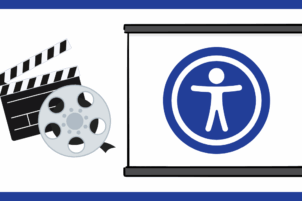Rhode Island, Feb. 10 – Attending the famous Sundance Film Festival, and on top of that, as a panelist on a livestreamed event with the festival, was an amazing experience! I was part of RespectAbility’s virtual panel “Mentorships Matter,” which discussed a new mentorship program by Women of Color Unite (WOCU) called #StartWith8Hollywood. The program matches women of color with mentors in the entertainment industry, enabling them to break down the systemic barriers and enter the industry. The panel featured disabled women of color who have been or are currently part of the mentorship program, an industry mentor, and the founders of WOCU. The conversation centered on why mentorships are key for individuals with multiple-underrepresented backgrounds to network and succeed.
The panel was introduced by Lauren Appelbaum, VP of Communications at RespectAbility. “I’m so excited about the partnership with Women of Color Unite, a social action organization focusing on fair access, fair treatment and fair pay for women of color in all aspects of the entertainment and media industries,” she said. The panel was moderated by Tatiana Lee, the Hollywood Inclusion Associate at RespectAbility, an award-winning actress, a Hollywood influencer and an international model.
Cheryl L. Bedford is the founder of Women of Color Unite/The JTC List and an NAACP Image Award nominated producer. Bedford grew up in a family of activists.
“I only had one job as a human being on this planet, and that was to make the world a better place for the next generation, and by doing so, we make it a better place now,” she said, recounting a lesson her mother taught her.
Bedford’s uncle was a judge and helped pass the Americans with Disabilities Act. His youngest son, her cousin, is disabled. Bedford repeatedly emphasized that she “fights against all the isms and leaves no underrepresented group behind.”
In terms of the entertainment industry, Bedford pointed out that women of color in the industry are getting lost and are often grouped with “women,” or “people of color.” Statistics prove that only 10% of women of color working in the industry belong to either a guild, a union or a trade organization. They’re not getting healthcare, pay, or networking through the unions or guilds. Bedford plainly said, “women of color are not getting in the room.”
In February 2018, she decided to start a database called the JTC List, named after her mother Joan Theresa Curtis. Ninety-three women showed up and by the end of the year the organization was a nonprofit, 501(c)(3). “A moment became a movement,” Bedford said. The JTC List had a database of about 3,000 members in four years.
During the pandemic, Bedford’s friend and founder of Bitch Pack, Thuc (pronounced “taupe” like the color) Doan Nguyen, started #StartWith8Hollywood on Twitter and social media. She tagged Bedford saying, “I think we’re onto something.” She agrees that “women of color fall through the cracks.”
“I think it’s important for as many of us to be seen and heard as possible,” Nguyen said. “The studio programs only serve so many, and still even the ones they serve are already familiar to them in one way or another through various connections.”
The founders of WOCU explained this underrepresentation as “exclusion by familiarity.” People often hire others who look like them, who they’re familiar with and who are in their circles.
“When I talk to people about exclusion by familiarity, this is what I mean,” Bedford explained. “You are not inherently racist, sexist, ableist, colorist, sizeist, homophobic or ageist. But, that exclusion of familiarity has led to these problems.”
Lee added her personal story saying, “I can relate because that’s where my activism started. I was falling through the cracks. But not only me, I saw other people fall through the cracks. I thought, I have to make something happen for me and my community.”
With the #StartWith8Hollywood program growing and an increase in mentees needing matches with mentors, Bedford pulled in Manon de Reeper. She is a co-founder of Indie Film Magazine Film Inquiry, a filmmaker and the co-creator of #Startwith8Hollywood mentorship program. De Reeper created Women of Color Unite’s “secret sauce forms,” as Bedford calls them. De Reeper explained that her history in psychology and criminology helped her know how to organize a lot of people using technology. Both the mentee and mentor submit a form to help the matchmaking process. Unlike other diversity applications, there are no hoops to jump through. All you have to do is sign up. Women of Color Unite doesn’t require anyone to write “trauma porn essays,” as de Reeper calls them. These essays often ask women of color or other underrepresented people to explain their background and how they got to this point. “They are normally looking for a ‘woe is me; I’m a poor person’ story and they’ll select people based on that,” de Reeper said. “In contrast, Women of Color Unite wanted to make sure everyone had the same chance.” She emphasized, “it only takes 10 minutes to fill it out. WOCU matches people based on parameters such as what position in the industry are you looking for, are you a horror or comedy writer, or a director?” So far, they’ve introduced more than 1,000 women of color to the industry in their first year.
The conversation turned to the mentees and our experiences with mentorships and Women of Color Unite. I was part of the first round of #StartWith8Hollywood. I commented that the scope and influence of the program made it appear as if WOCU has been around for longer and I was part of the second or third round. I’m honored to be one of the first mentees.
As an autistic writer, actress and advocate, mentorships played a big role in helping me feel confident to tell my story and speak openly about my disability. I was diagnosed on the autism spectrum later in life, at 18 years old. (Some people are diagnosed as children as young as three to five years old). This diagnosis added another facet to my already complex identity as an international, Chinese, Jewish adoptee.
I agree with Appelbaum’s statement that “as a person with a disability, you need someone in your corner who wants you to succeed.” My mom was the first and still is the primary mentor in my “corner.” She always encouraged me and worked with me to find and hone my strengths in a world that likes to remind disabled people of their deficits. She was and still is my best friend, also reassuring me that I will “find more of my people.”
I first found my people in high school theatre, and later during a gap year from Sarah Lawrence College as a founding member of a neurodiverse theatre company. That gap year was my first experience with mentors. My passion for the arts and entertainment led me to RespectAbility. I’m an alumna of their Summer Entertainment Lab for Professionals with Disabilities. During the Lab, I met Bedford and learned about WOCU and #StartWith8Hollywood. Being a part of RespectAbility and WOCU is another step toward finding mentors and creating my own inclusive communities.
As part of #Startwith8Hollywood, I was matched with Teale Sperling, a development executive and content producer at Mattel; she’s a little person. Fun fact: Sperling is married to Nic Novicki, founder of the Easterseals Disability Film Challenge. As part of the program, mentees are guaranteed one meeting with their mentors, and in return, the mentors commit to one action that can help the mentee’s career. For me, that action was looking over two of my first original pilots and resume. During our meeting, Sperling and I talked about writing, and how to navigate an industry not built for anyone who is different.
Meeting with Sperling and other professionals in the entertainment industry is priceless. As a newcomer, I know I have a lot to learn. Mentors have “been there, done that.” They can help answer my many questions, and introduce me to more people in the industry, building my network. As I said during the panel, tthe more people you have in your corner the better. One mentor might share your disability, another might share your racial background. Each has something to teach you.
Diana Romero is participating in the second cycle of #StartWith8Hollywood mentorship matches. She is an award-winning producer and has worked in the industry for more than a decade. Romero explained how the odds are already stacked against her as a Latina woman. When she was diagnosed with multiple sclerosis (MS), she knew the odds just got harder to make it in the industry. After years of working on set, Romero had to re-evaluate her life and what she wanted to do. She decided to lean into her passion for writing. When she was accepted into the Producer’s Guild of America Power of Diversity Workshop, she met RespectAbility board member Delbert Whetter.
Upon joining the RespectAbility Lab, Romero said she felt part of a group that she never imagined existed. “As someone without a disability it wasn’t something I was actively looking for,” Romero explained. The Lab helped Romero face being a person with an acquired disability and as she explained, it helped her decide “what I wanted to do for the rest of my life and how I was going to do it.” Through the Lab, Romero said she was “able to meet more people in my tribe, and also meet professionals who are going to be making those hiring decisions and opening doors.”
Sheryl J. Anderson serves as a mentor as part of the #StartWith8Hollywood program. Anderson is a novelist, screenwriting instructor and tv writer/producer. Currently she’s the showrunner of Sweet Magnolias on Netflix. She said many showrunners are nervous about working with people with disabilities because they don’t have people in their lives with disabilities. Anderson worked with a writer with MS. At the beginning of the season, Anderson asked the writer to “tell me what I can do for you.” She wanted to make sure the writer was comfortable. Anderson said, “I would have that conversation with anybody regardless of their disability.” As a showrunner she said, “It’s my responsibility to take care of everyone who works for me. I want you to take care of yourself, because you’re going to be more comfortable and more focused in the room.”
According to Anderson, some people in the industry want to surround themselves with people just like them. Anderson wants to expand their vision, saying, “think of yourself as a great writer and simply surround yourself with great writers.” It’s important to Anderson to have a diverse writer’s room, even beyond the show’s cast. “There doesn’t need to be a one-to-one match… even though some shows still need help with that,” she said. “I think about how beautiful a diverse room is, and the great product that results. So, to me the more diverse, the more beautiful.”
“I love #Startwith8Hollywood because I’m meeting people I wouldn’t meet otherwise,” she added. “I learn from my mentees. And I want to encourage other show runners to throw open the door as much as possible.”
Future for #StartWith8Hollywood and Other Industry Diversity Programs
Bedford hopes in the future we will not need programs like this. She would eventually like to run production through Women of Color Unite and serve as a fiscal sponsor to help women of color create their own projects. Bedford said, “we need to get people into more spaces.”
When de Reeper sent out a survey to #StartWith8Hollywood mentees, 76% of mentees from round one said that what it gave them was hope. “It just makes me stop,” Bedford said in reaction. “And it makes me really angry because of all the isms that have led to this lack of hope. The more marginalized someone is, the less hope they have.” According to Bedford, “the industry should be ashamed of itself.”
Minorities need to know about the majority, but the majority does not need to know about the minority, Bedford added. “Black people can write for white people, because that’s the default. Women can write for men, because male is the default. Those with disabilities can write for those who aren’t considered disabled.”
Unfortunately, as Bedford added, “what we have is the majority writing for the minority except they don’t need to know about us. So, if people really wanted to make money, they would hire the most marginalized because they can write about or direct everybody.”
“When they don’t include us, you end up with inspiration porn, or trauma porn, which is not my experience,” Lee added. It’s my experience based on your assumption of me.”
Romero added how people think she is different because she uses a wheelchair, but really, she is no different than anybody else. Everyone sits in chairs, she explained. “My legs don’t do my thinking; they don’t give me my creativity,” Romero joked. “Because I use a wheelchair to move around doesn’t make me any lesser than who I am and who I’ve always been.”
Romero agreed with Bedford that as someone of underrepresented communities, she’s able to write about a broad range of topics. “Just because I use a wheelchair, just because I’m Latina, just because I’m a woman, doesn’t mean that those are the only three things I can write about,” she said.
“We’re more than our identifiers. We all live really full lives,” De Reeper said. “I think by uplifting and supporting women in these marginalized groups and putting them onscreen but also in any role behind the screen, it will contribute to the visibility of these people.” De Reeper hopes that through organizations like WOCU and programs like #StartWith8Hollywood, the industry will reach organic diversity. She explained, “the agents will all know someone that they can recommend when a show runner asks for a black writer, or a disabled writer, or anything. The end goal is that we will create lasting relationships, and people can connect and refer each other.”
As a woman of color, and on top of that, as a disabled woman of color, breaking into the entertainment industry can feel as hard as escaping Jumanji. It’s essential for the writers’ rooms, and all aspects of the industry, to not only reflect the cast onscreen, but to reflect the diverse outside world. Underrepresented people can write about more than their own identities. We want to write about a lot more than just our own identities. Give us a chance and prove Hollywood wrong.
I’m excited to hear that #Startwith8Hollywood cycle three is going to happen in summer of 2021. The program is expanding to the United Kingdom as well as Canada. And at some point, de Reeper said they would like to go to Australia. I can’t wait to see more powerhouse women of color including disabled women of color making waves in the industry, just like our panelists are doing right now.







